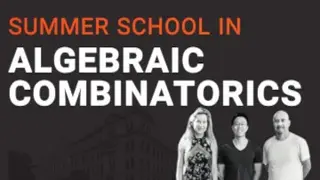Summer School in Algebraic Combinatorics
Combinatorics is the study of finite and discrete structures. Starting from fundamental questions of ordering, decomposition and structuring of finitely many objects or states, combinatorics represents the nanotechnology of mathematics and its applications. Due to its interdisciplinarity, it is a central mathematical research area with influence across disciplinary boundaries, and hence plays a key role for Mathematics in the Sciences.
This summer school focuses on Algebraic Combinatorics. This branch employs methods of abstract algebra, notably group theory, representation theory and algebraic geometry, in various combinatorial contexts and, conversely, applies combinatorial techniques to problems in algebra. Key players include matroids, polytopes, hyperplane arrangements, root systems, generating functions, posets and lattices, symmetric functions, and Young tableux.
Three outstanding speakers (Chris Eur, Greta Panova and Vic Reiner) will present short courses on current topics in Algebraic Combinatorics. The lectures will take place from Monday afternoon to Friday afternoon.
This school is supported by the new DFG Priority program SPP "Combinatorial Synergies" (see the link below).
Registration is already closed.
Chris Eur: Log-concave rainbows and where to find them
Many combinatorial objects admit "signed" or more generally "colored" versions. We will study some general tools in combinatorial algebraic geometry that one can use to deduce numerical properties about these "colored" combinatorial objects, drawing upon joint works with Emily Clader, Chiara Damiolini, Alex Fink, Daoji Huang, Matt Larson, Shiyue Li, and Hunter Spink.
Greta Panova: Computational Complexity in Algebraic Combinatorics
Algebraic Combinatorics studies objects and quantities originating in Algebra, Representation Theory and Algebraic Geometry via combinatorial methods, finding formulas and neat interpretations. Some of its feats include the hook-length formula for the dimension of an irreducible symmetric group (
In this minicourse, we will discuss how Computational Complexity Theory provides a theoretical framework for understanding what kind of formulas or rules we could have. We will introduce the basic concepts from computational complexity theory (including complexity classes, complete problems, reductions etc) and the important objects from Algebraic Combinatorics (Specht modules, Schur functions, Littlewood-Richardson and Kronecker coefficients etc). We will formulate our problems in terms of computational complexity and discuss some known results. Finally, as a proof of concept we show that the square of a symmetric group character could not have a combinatorial interpretation.
Vic Reiner: The Koszul Property in Algebraic Combinatorics
Many graded algebras appearing in Algebraic Combinatorics turn out to have the Koszul Property, which is defined algebraically. This property has interesting combinatorial consequences for the Hilbert series of the algebra, and naturally leads one to study its partner, called its Koszul dual algebra.
Examples of Koszul algebras include polynomial algebras, exterior algebras, Stanley-Reisner rings of posets and flag complexes, Orlik-Solomon algebras for supersolvable hyperplane arrangements, Veronese and Segre rings, Hibi rings, Chow rings of matroids, and partial commutation monoid algebras.
In addition to these examples, this course will discuss basic theory of Koszul algebras: their combinatorial properties, constructions, and their interaction with topics such as affine semigroup rings, walks in digraphs, representation stability, unimodality, log-concavity, the Polya frequency property and the Charney-Davis-Gal conjecture.
